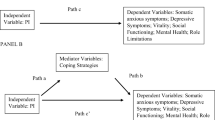Abstract
The aim of this study was to investigate the relationship between coping styles, depressive symptoms and somatic complaints among depressive inpatients. This cross-sectional study included 74 clinical inpatients being treated for depression at one of six psychiatric hospitals in Belgium. All participants completed a questionnaire containing the Utrecht Coping list, the Beck Depression Inventory, and the Symptom Checklist. A significant positive association between depressive symptoms and somatic complaints was found. In addition, multiple regression analyses revealed that patients who use more effective problem-focused coping or emotion-focused coping styles experience less depressive symptoms. No significant relationship was found between coping and somatic complaints. In addition, coping did not influence the relationship between somatic complaints and depressive symptoms. Because effective coping styles are associated with less depressive symptoms among depressive patients, we conclude that treatment should also emphasise the use of effective problem-focused and emotion-focused coping. (Netherlands Journal of Psychology, 64, 78-86.)
Similar content being viewed by others
References
American Psychiatric Association (2000). Diagnostic and Statistical Manual of Mental Disorders. Fourth Edition, Text Revision. Washington: APA.
Arrindell, W.A., & Ettema, J.H.M. (1986). SCL-90. Een multidimensionele psychopathologie indicator (The SCL-90. A multidimensional instrument for the assessment of psychopathology). Lisse, the Netherlands: Swets & Zeitlinger.
Beck, A.T., Steer, R.A., & Brown, G. (2002). The Dutch version of the Beck Depression Inventory-second edition. Enschede: Harcourt.
Bouman, T.K., Luteijn, F., Albersnagel, F.A. & Van der Ploeg, F.A.E. (1985). Enige ervaringen met de Beck Depression Inventory. Gedrag, 13(13-24).
Burker, E.J., Evon, D.M., Marroquin Losielle, M., Finkel, J.B. & Mill, M.R. (2005). Coping predicts depression and disability in heart transplant candidates. J Psychosom Res, 59(4), 215-222.
Carver, C.S., Scheier, M.F. & Weintraub, J.K. (1989). Assessing coping strategies: a theoretically based aproach. Journal of Personality and Social Psychology, 56, 267-283.
Cohen, J. & Cohen, P. (1983). Applies multiple regression/correlation analysis for the behavioral sciences (2nd edition). Hillsdale, NJ: Erlbaum.
Derogatis, L.R. (1977). SCL-90: Administration, scoring and procedures manual-I for the R(evised) version. Baltimore: Johns Hopkins School of Medicine, Clinical Psychometrics Research Unit.
Evers, A., Van Vliet-Mulder, J.C., Groot, C.J. (2000). Documentatie van Tests en Testresearch in Nederland. Assen: Van Gorcum.
Garnefski, N., Kraaij, V., & Spinhoven, P. (2001). De relatie tussen cognitieve copingstrategieën en symptomen van depressie, angst en suïcidaliteit. Gedrag & Gezondheid, 29(3), 148-158.
Garnefski, N., Teerds, J., Kraaij, V., Legerstee, J. & Van den Kommer, T. (2004). Cognitive emotion regulation strategies and depressive symptoms: differences between males and females. Personality and Individual Differences, 39, 267-276.
Hotopf, M., Mayou, R., Wadsworth, M. & Wessely, S. (1998). Temporal relationships between physical symptoms and psychiatric disorder. Results from a national birth cohort. Br J Psychiatry, 173, 255-261.
Jensen, M.P., Engel, J.M. & Schwartz, L. (2006). Coping with cerebral palsy pain: a preliminary longitudinal study. Pain Med, 7(1), 30-37.
Jensen, M.P., Turner, J.A. & Romano, J.M. (2001). Changes in beliefs, catastrophizing, and coping are associated with improvement in multidisciplinary pain treatment. J Consult Clin Psychol, 69(4), 655-662.
Kloens, G.J., Barelds, D.P.H., Luteijn, F. & Schaap, C.P.D.R. (2002). De waarde van enige vragenlijsten in de eerstelijn. Diagnostiekwijzer, 5, 130-148.
Kraaij, V., Garnefski, N., & Maes, S. (2002). The joint effecst of stress, coping, and coping resources on depressive symptoms in the elderly. Anxiety, Stress, and Coping, 15(2), 163-177.
Lazarus, R.S. (1999). Stress and emotion. New York: Springer Publishing Company.
Lazarus, R.S., & Folkman, S. (1984). Stress, appraisal, and coping. New York: Springer Publishing Company.
Magni, G., Moreschi, C., Rigatti-Luchini, S., & Merskey, H. (1994). Prospective study on the relationship between depressive symptoms and chronic musculoskeletal pain. Pain, 56(3), 289-297.
Matheson, K., & Anisman, H. (2003). Systems of coping associated with dysphoria, anxiety and depressive illness: a multivariate profile perspective. Stress, 6(3), 223-234.
Mercado, A.C., Carroll, L.J., Cassidy, J.D. & Cote, P. (2005). Passive coping is a risk factor for disabling neck or low back pain. Pain, 117(1-2), 51-57.
Ohayon, M.M. (2004). Specific characteristics of the pain/depression association in the general population. J Clin Psychiatry, 65 Suppl 12, 5-9.
Ohayon, M.M. & Schatzberg, A.F. (2003). Using chronic pain to predict depressive morbidity in the general population. Arch Gen Psychiatry, 60(1), 39-47.
Ravindran, A.V., Matheson, K., Griffiths, J., Merali, Z. & Anisman, H. (2002). Stress, coping, uplifts, and quality of life in subtypes of depression: a conceptual frame and emerging data. J Affect Disord, 71(1-3), 121-130.
Schatzberg, A.F. (2004). The relationship of chronic pain and depression. J Clin Psychiatry, 65 Suppl 12, 3-4.
Schatzberg, A.F., Arnow, B.A., Burt, V.K., Delgado, P.L., Nonacs, R.M. & Ohayon, M.M. (2004). Depression and physical symptoms: the mind body connection. Journal of Clinical Psychiatry, 65(6), 867-876.
Schreurs, P.J.G., Van de Tellegen, B. & Brosschot, J.F. (1993). De Utrechtse Copinglijst (UCL). Lisse: Swets & Zeitlinger.
Turk, D.C. & Okifuji, A. (2002). Psychological factors in chronic pain: evolution and revolution. J Consult Clin Psychol, 70(3), 678-690.
Vlaeyen, J.W. & Morley, S. (2005). Cognitive-behavioral treatments for chronic pain: what works for whom? Clin J Pain, 21(1), 1-8.
Zeidner, M., & Saklofske, D. (1996). Adaptive and maladaptive coping. In M. Zeidner & N.S. Endler (Eds.), Handbook of coping: Theory, research, applications (pp. 505-531). New York: John Wiley & Sons.
Author information
Authors and Affiliations
Corresponding author
Additional information
Submitted 18 February 2008, revision accepted 28 March 2008.
Rights and permissions
About this article
Cite this article
van Hooren, S.A.H., Vermeiren, J. & Bolman, C. The relationship between coping styles, depressive symptoms and somatic complaints among depressive inpatients. NEJP 64, 78–86 (2008). https://doi.org/10.1007/BF03076409
Issue Date:
DOI: https://doi.org/10.1007/BF03076409



